By Sharmila Rao Thakkar
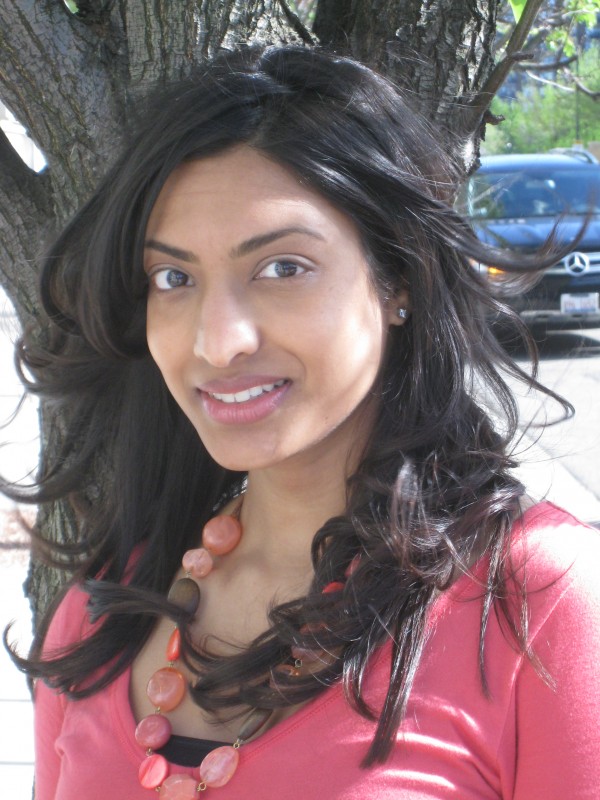
Masalamommas Editorial Board Member
My mom was six years older than I am today when my dad passed unexpectedly of a heart attack. I was 20, a junior in college, my brother just starting his first college semester also away from home. I’ll never forget the cryptic call from a family member and packing dark clothes in a duffle bag with just a second sense that something had happened.
Then 17 years later living a time zone away with two young children of my own, I received the dreaded call – my mom needed to go in for immediate angioplasty. Due to her strong family history of heart conditions, she had been having yearly cardiac screenings, including stress tests and echocardiograms.
Her cardiologist noticed an abnormality when comparing results to past years and suggested an angiogram; she had no symptoms. The angiogram showed 2 blocks at nearly 90%; the angioplasty resulted in 3 stents to open up the blocked arteries.
While it was considered preventive I suppose, nothing can wipe away the fear that my brother and I sat with in that hospital waiting room. But at least the yearly screening caught it in time, this time.
My mom’s bout with heart surgery came after losing her mother to a heart attack at the early age of 60, her brother who had a heart attack at 38 and passed at 40 and several other family members have suffered from heart, cholesterol, diabetes problems and successive treatments over the years. To say we have a family history of heart disease would be an understatement…
That’s why attending this year’s A Red Sari Evening hosted by Advocate Lutheran General Hospital Heart Institute’s South Asian Cardiovascular Center was SO meaningful. It was a reminder that while I may have a heightened awareness none of us is immune to heart disease or the related health issues, and act we must – to learn, to educate, to share, to make the lifestyle and behavioral changes that will impact our health for the better.
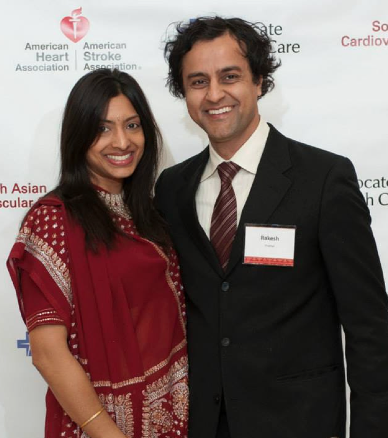
The 2nd annual A Red Sari Evening held in collaboration with the American Heart Association Chicago with support from the Chicago Sister Cities International-Delhi Council took place on Saturday, March 7th at Macy’s on State Street in Chicago, IL. The event drew nearly 250 attendees from the health care, business, nonprofit and public sectors, all who came together to learn more, fundraise and bring attention to the prevalence of heart disease among South Asians.
Event planning and management company vChilli helped create an elegant ambiance including a festive Indian bazaar with traditional treats, masala chai, a chaat station, henna design booth and more.
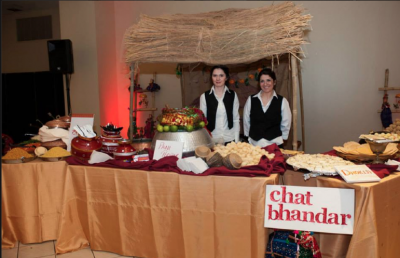
Did you know?
– South Asians account for approximately 20% of the world’s population, but carry 60% of the heart disease burden.
– South Asians are at about 4 times greater risk of developing heart disease than the general population.
– South Asian women have a 30% increased risk of heart disease when compared to Caucasians and a 325% increased risk when compared to those of Chinese descent.
– Among South Asian men, 25% of heart attacks occur under the age of 40 and 50% occur under the age of 50.s
– 30% of cardiac-related death among South Asians occurs under the age of 65.
Chicago’s Channel 7 ABC News anchor and reporter Ravi Baichwal emcee’d the event, opening by sharing his own story about a life touched by heart disease. Baichwal’s father was 44 when he suffered a heart attack in the late 1970s – when there was virtually no awareness around this issue in our community.
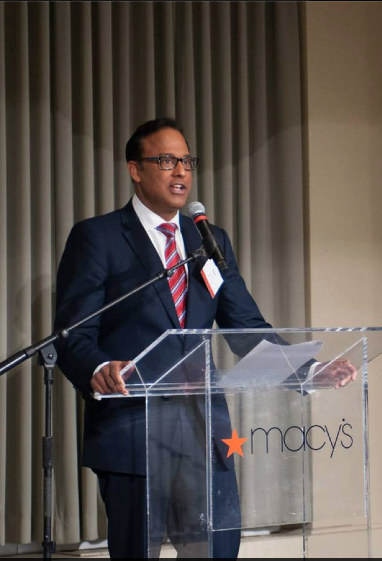
ABC Anchor, Ravi Baichwal
He became one of the first patients to be prescribed cardiovascular exercise as rehab and went on to live another 25 years, becoming a jogger and quitting smoking. While he had a second chance, Baichwal explains how invaluable it was to have his dad around during his youth and wants to help prevent other kids from going through what he did. When he surveyed the room of attendees about how many have had similar experiences, eyes widened when nearly half the room raised their hands.
Shoeb Sitafalwalla, MD, a cardiologist and now medical director of the South Asian Cardiovascular Center at Advocate Lutheran General Hospital, who convinced the hospital to launch the center in 2013, conceived of the initiative and inaugurated the event last year when he realized the broader collaborations necessary to take this work and the message further.
“Nearly 30% of South Asians living in North America are diabetic,” said Sitafalwall. “Take that with the standard South Asian diet heavy in fried food and carbohydrates and for many South Asians whose professions tend to be more sedentary and that involve a lot of sitting and desk work, that also means we don’t get the exercise we need to keep our hearts healthy.”
Perhaps most basic of the messages: “Heart disease is preventable. We just need the courage to make healthy choices. It is possible.”
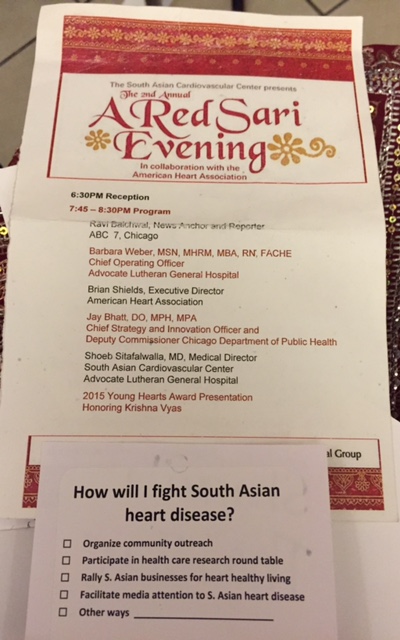 It was also a night to celebrate accomplishments.
It was also a night to celebrate accomplishments.
During the event, a new and groundbreaking partnership was announced — South Asian Healthy Eating Benefits (SAHEB). Earlier this year, the Chicago Department of Public Health and the Advocate Heart Institute’s South Asian Cardiovascular Center launched this pilot program to encourage better eating habits and lifestyle changes among South Asians.
Restaurant owners and chefs at four of Chicago’s South Asian restaurants (Curry Bowl, Gaylord Fine Indian Cuisine, Mysore Woodlands and Viceroy of India) have committed to the program and have already been successful in reducing sodium and saturated fats in some of their menu items.
Illinois-based Patel Brothers, the largest South Asian food retailer in the country, has also signed on to join SAHEB, providing healthier packaged food items, displaying consumer education on healthy choices in their stores and introducing low fat and low sodium products under their SWAD brand name.
We also heard that a new partner, the nation’s largest pharmacy retailer Walgreens has joined the fight against heart disease in South Asians by launching a new set of digital heart health tools and opportunities to incentivize healthy behavior. “There are 250,000 South Asians in Chicago, now we can have an impact beyond on the 3.5 million South Asians across the country,” asserted Dr. Sitafalwalla. “
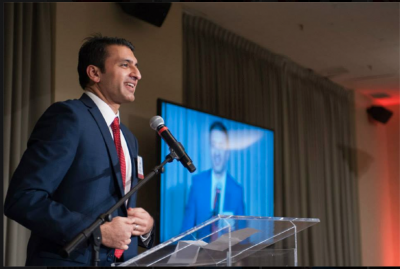
Dr. Shoeb Sitafalwalla,
Additionally, we learned about the exciting launch of a clinical trial to be initiated on the heels of new research out of Loyola University of Chicago Stritch School of Medicine which found that up to 8% of people of South Asian descent present with a genetic mutation that prevents the heart from pumping blood effectively, causing heart failure and potentially fatal heart attacks. The lab is enrolling patients now, with the hope of developing new treatments and prevention strategies.
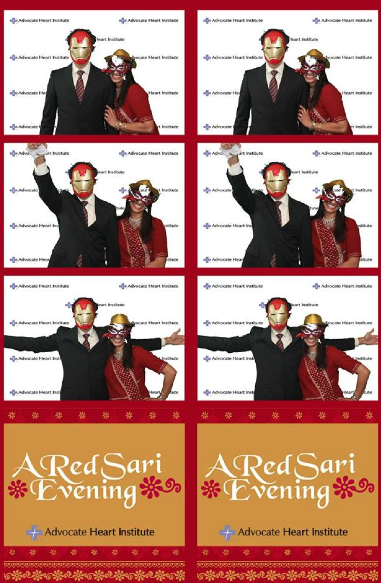
Having a little fun at the Red Sari Gala!
“We now have the momentum we need to get something done,” said Sitafalwalla. “I believe what we are doing in Chicago will be a model for what can be accomplished nationwide to prevent heart disease in the South Asian community and other at-risk ethnic groups. Transformative change will happen with such partnerships and will help make heart disease something of the past.”
The South Asian Cardiovascular Center, a partnership of Advocate Lutheran General Hospital and Advocate Medical Group, is the first center of its kind designed to serve the South Asian community through a unique combination of community outreach, culturally sensitive, advanced clinical services and research.
“When you work with people from our region you quickly realize how many are unaware of the risk factors and causes of disease in their day to day lives,” said Ranjana Bhargava, advisory board member, chef, and mother of two. “Prevention of diabetes, heart problems and stroke through education, repeated heart healthy messages, proper diet and exercise is essential for our community. My goal is to illustrate through life stories, practical tips and healthy living easy ways to stay connected to medical and self-care.” Bhargava is a strong advocate and volunteer for the American Heart Association and the South Asian Cardiovascular Center and has a family connection to heart disease.
Other moms, like Ira Shetty, MD, a pediatric cardiologist came to the event with her mother Sarah Bhaskar.
The statistics are shocking,” said Bhaskar. “We hear about it, we read it, we know it … still we always think it’s someone else’s problem. My daughter’s career in cardiology has continued to help raise my awareness and keep me making healthy choices.
Her mother was honored to be her guest and learn more about an issue that often doesn’t get the talk time in our community. “We often take our health for granted, especially women,” she said. “Now, when my daughter reminds me to take that walk or calls about my pills, I am not annoyed, I’m grateful.”
As a pediatric cardiologist, Dr. Shetty sees her patients’ parents concerned for their children’s health, particularly when there is a family history of heart disease/heart attack.
“Teenagers tend to think they are invincible. When they have or are experiencing family health challenges, it’s a chance for me to try to get them to listen about making health a priority. But, we’ve got to do more.”
When asked if we have done enough to educate women and girls, both mother and daughter agree:
“No, not enough. How many South Asian girls and women do you know that exercise consistently? Exercising is important. And it has to start at home. We need to see exercise not as something we can only do on a field, but that we must do every day – as part of our regimen to stay healthy.”
Right on!
While the event’s call to action rightfully includes research, outreach and media attention, the real change and behavior modification involves much more than education and awareness. It requires a concerted and intentional individual charge too, such as: making healthy choices while shopping and cooking, eating right, exercising, taking care of your body holistically early and often not just when there’s a problem.
After experiencing an ulcer and some other symptoms of stress recently, pleas from my spouse and my mom were just the additional push I needed to be more thoughtful about my own practice around staying healthy.
As a parent, we often put ourselves last, and I am the first to declare it’s not easy to carve out time for this, but that can no longer be an excuse.
Women often serve as the gatekeepers to their family’s health – you have a healthy mother, you will have healthy children, and a healthy family.
I’ve started an online meditation course, am limiting my meetings over meals and cappuccinos, trying not to eat after 7, refraining from finishing the kids’ leftovers…and hoping to institute a routine of reading the morning news on the treadmill. It’s not only about losing weight, it’s about maintaining health. Indeed, it won’t be easy with two school age children and a full time job but I must give it a try. My health and that of my family depends on it.
Will you hold me to it?
*All data/facts from The South Asian Cardiovascular Center at Advocate Lutheran General Hospital in Park Ridge, Illinois, USA.
©masalamommas and masalamommas.com, 2016-2017. Unauthorized use and/or duplication of this material without express and written permission from this site’s author and/or owner is strictly prohibited. Links may be used, provided that full and clear credit is given to masalamommas.com and Masalamommas online magazine with appropriate and specific direction to the original content.


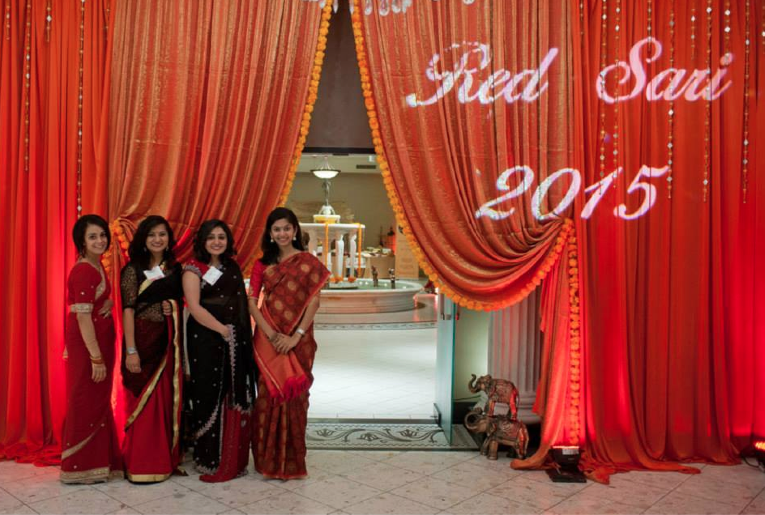
There are no comments
Add yours